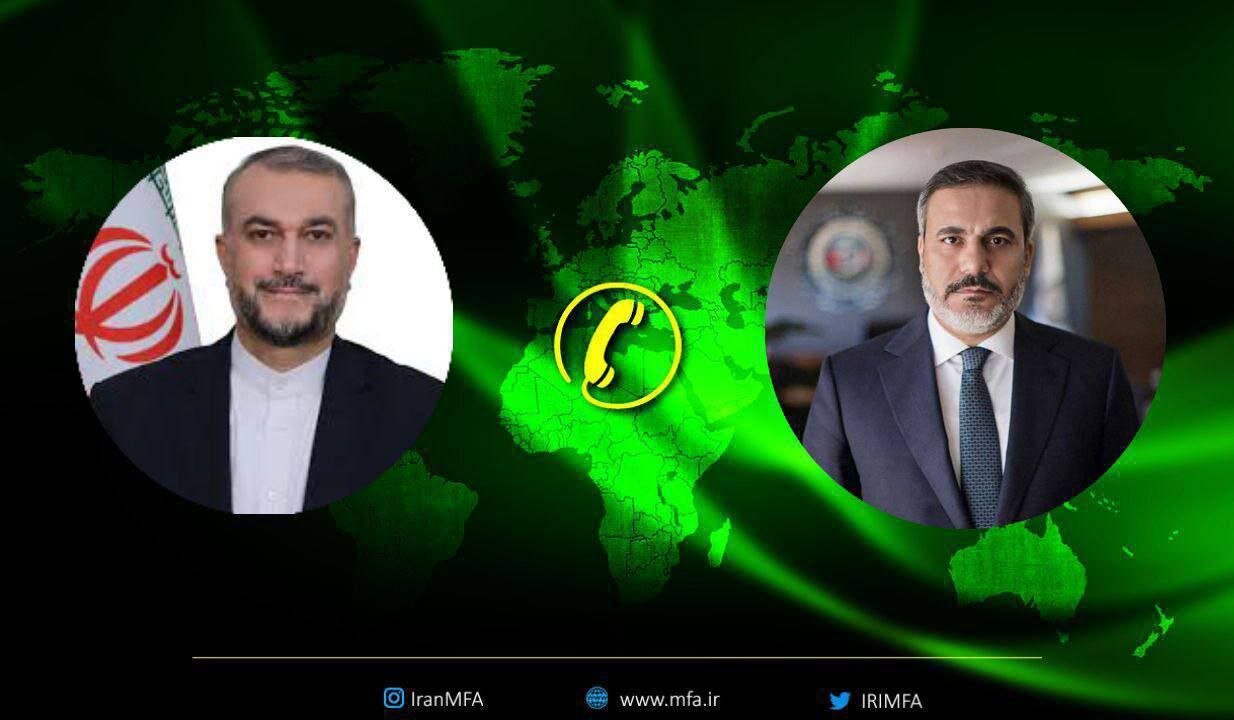Iran, Turkey signal readiness, support to help Gaza

TEHRAN- Following weeks of intense Israeli airstrikes, the foreign ministers of Iran and Turkey have supported attempts to prolong the truce in the Gaza Strip and reiterated their nations’ support for Palestine.
Following a four-day ceasefire in Gaza, Iranian Foreign Minister Hossein Amir Abdollahian and his Turkish counterpart Hakan Fidan discussed the most recent events in Palestine over the phone on Saturday.
Amir Abdollahian emphasized that Iran, Turkey, and other Muslim nations must act more firmly in favor of the Palestinian people in order to put an end to the Zionist regime’s crimes against Gaza and the West Bank.
Along with applauding the increasing trend of Tehran-Ankara collaboration in a number of areas, he expressed hope that ongoing high-level diplomatic connections would improve and deepen relations between the two neighbors.
Fidan, for his part, underscored Turkey’s determination to work toward extending the Gaza truce.
He also praised Turkey and Iran’s deep and varied relationship, expressing optimism that ongoing talks and reciprocal visits will strengthen the two countries’ ties.
Since October 7, almost 14,800 Palestinians—including 6,150 children— have been killed in Gaza as a result of Israeli bombardment.
A four-day truce between the Israeli regime and Gaza came into effect on Friday morning following protracted discussions and a minimum of twenty-four hours of delay.
In return for Palestinian women and children being held in Israeli jails, detainees held in Gaza were freed.
Back in September, in a joint press conference with Fidan, Amir Abdollahian reiterated Tehran’s position that the Islamic Republic will not tolerate any geopolitical changes in the Caucasus region.
The Iranian foreign minister also said Tehran and Ankara are planning to increase their trade ties. “The target for the volume of bilateral trade is 30 billion euros. Good agreements were reached between the two countries during an Iranian delegation’s visit to Ankara. Today, we emphasized these agreements. We prefer to update the preferential trade document.”
Abdollahian added that transit routes in the region are not a source of competition between Iran and Turkey, rather they benefit both countries and help strengthen relations.
Iran’s chief diplomat also said the disputes between Syria and Turkey should be settled through diplomacy.
“During the discussions, we also addressed the issues between Syria and Turkey. Emphasizing the sovereignty of countries, we believe that Turkey and Syria's concerns should be addressed through diplomatic means. Iran, considering its friendly relations with Damascus, is making efforts to address the concerns of our brothers in Turkey,” Amir Abdollahian said.
Amir Abdollahian also said he and his Turkish counterpart discussed the situation in Ukraine, Afghanistan and the recent sacrilegious moves against the holy Quran in Sweden and Denmark.
The Turkish foreign minister praised the strong historical ties between Turkey and Iran.
Iran urges perpetual peace in South Caucasus without foreign intervention
In a post on his X account on Sunday, Amir Abdollahian said he has held a meeting with the ambassadors of Iran to the Republic of Azerbaijan and Armenia.
The South Caucasus region is important to Iran’s foreign policy, according to Amir Abdollahian, who also stated that Tehran supports efforts to maintain long-term peace and stability in the region without the involvement of foreigners.
The senior diplomat stated that during the discussion, he made it clear that the South Caucasus region is important in Iran’s foreign policy.
Amir Abdollahian further pointed out that he has stressed the Foreign Ministry’s focus on measures to secure long-term peace and stability in the South Caucasus without external intervention, as well as to expand relations with Armenia and the Republic of Azerbaijan in accordance with the neighborliness policy.
On October 23, Tehran played host to the 2nd meeting of the “3+3” Regional Platform, titled "time for peace, cooperation and progress in South Caucasus."
The foreign ministers of Iran, Russia, Turkey, Armenia, and the Republic of Azerbaijan issued a joint communiqué at the end of the meeting, emphasizing the importance of peaceful resolution of disputes in the South Caucasus, as well as respect for all states’ sovereignty, political independence, and territorial integrity.
